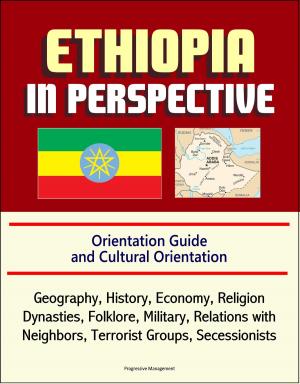China's Largesse: Why China is Generous With Foreign Aid - History of Communist China's Foreign Policy in Cambodia and Kenya, Pursuit of Sovereignty in the South China Sea, Threat to U.S. Interest
Nonfiction, History, Asian, China, Social & Cultural Studies, Political Science| Author: | Progressive Management | ISBN: | 9780463690581 |
| Publisher: | Progressive Management | Publication: | June 23, 2018 |
| Imprint: | Smashwords Edition | Language: | English |
| Author: | Progressive Management |
| ISBN: | 9780463690581 |
| Publisher: | Progressive Management |
| Publication: | June 23, 2018 |
| Imprint: | Smashwords Edition |
| Language: | English |
This important report has been professionally converted for accurate flowing-text e-book format reproduction.
What has China gained from its foreign aid and investment activity? Does the instrument China chooses reveal its political motive? Does Chinese economic statecraft present a challenge to U.S. national interest? To answer these questions, this thesis examines the history of Communist China's foreign policy in Cambodia and in Kenya since 1956 and 1964, respectively. China has delivered aid to, made investments in, and traded with both states, but the interests China has pursued, and the vigor with which it has pursued them, are different in each. In Cambodia, China has a rich and continuing record of intrusive political influence and military engagement. In Kenya, China's purchase of political influence under Mao has cooled considerably to become today's arm's-length trade and development relationship. This thesis concludes that Chinese economic statecraft buys political influence in Cambodia but not in Kenya, where aid is developmental and investment is driven by business opportunity. From both realist and liberal perspectives, China's economic statecraft presents a challenge to the interests of the United States.
I. INTRODUCTION * A. MAJOR RESEARCH QUESTIONS AND FINDINGS * B. SIGNIFICANCE OF THE RESEARCH QUESTION * C. LITERATURE REVIEW * 1. Aid Outcomes * 2. Policy Objectives * 3. International Relations * D. POTENTIAL EXPLANATIONS AND HYPOTHESES * E. RESEARCH DESIGN * 1. Similarities between Cambodia and Kenya: History, Economy, and Resources * 2. Differences between Cambodia and Kenya: Geographic, Political, and Cultural Proximity to China * F. CONCLUSION * II. CHINA'S INTERESTS IN CAMBODIA * A. PURSUIT OF ONE CHINA * B. CAMBODIA AS A COLD WAR COUNTERWEIGHT * C. PURSUIT OF SOVEREIGNTY IN THE SOUTH CHINA SEA * D. PURSUIT OF DEVELOPMENT ON THE MEKONG RIVER * E. CONCLUSION * III. CHINA'S AID IN KENYA * A. AID IN THE 1960S: ONE CHINA, REVOLUTION, AND COLD WAR POLITICS * B. FREEZE AND THAW, 1965-80 * C. CHINA'S ECONOMIC STATECRAFT IN MODERN KENYA * 1. Aid * 2. Trade * 3. Foreign Direct Investment * D. CONCLUSION * IV. CONCLUSION * A. THREAT TO U.S. NATIONAL INTEREST * 1. Formulation of U.S. National Interest: Realism * 2. Formulation of U.S. National Interest: Liberalism * 3. U.S. National Interest and China's Economic * Engagement * B. HYPOTHESIS VALIDATION * 1. China Buys Influence with Foreign Aid and Investment * 2. China's Expansion of Influence Conflicts with U.S. Interests * 3. Choice of Financial Mechanism Reveals China's Intent * C. FURTHER RESEARCH * 1. Broader Scope * 2. Characterizing China as a Regional or Global Power * 3. China's Intent and the Supply and Demand of Foreign Aid * 4. Do Chinese Aid and FDI Chase Natural Resources? * 5. Is Kenya a Part of OBOR? * D. CONCLUSION
This important report has been professionally converted for accurate flowing-text e-book format reproduction.
What has China gained from its foreign aid and investment activity? Does the instrument China chooses reveal its political motive? Does Chinese economic statecraft present a challenge to U.S. national interest? To answer these questions, this thesis examines the history of Communist China's foreign policy in Cambodia and in Kenya since 1956 and 1964, respectively. China has delivered aid to, made investments in, and traded with both states, but the interests China has pursued, and the vigor with which it has pursued them, are different in each. In Cambodia, China has a rich and continuing record of intrusive political influence and military engagement. In Kenya, China's purchase of political influence under Mao has cooled considerably to become today's arm's-length trade and development relationship. This thesis concludes that Chinese economic statecraft buys political influence in Cambodia but not in Kenya, where aid is developmental and investment is driven by business opportunity. From both realist and liberal perspectives, China's economic statecraft presents a challenge to the interests of the United States.
I. INTRODUCTION * A. MAJOR RESEARCH QUESTIONS AND FINDINGS * B. SIGNIFICANCE OF THE RESEARCH QUESTION * C. LITERATURE REVIEW * 1. Aid Outcomes * 2. Policy Objectives * 3. International Relations * D. POTENTIAL EXPLANATIONS AND HYPOTHESES * E. RESEARCH DESIGN * 1. Similarities between Cambodia and Kenya: History, Economy, and Resources * 2. Differences between Cambodia and Kenya: Geographic, Political, and Cultural Proximity to China * F. CONCLUSION * II. CHINA'S INTERESTS IN CAMBODIA * A. PURSUIT OF ONE CHINA * B. CAMBODIA AS A COLD WAR COUNTERWEIGHT * C. PURSUIT OF SOVEREIGNTY IN THE SOUTH CHINA SEA * D. PURSUIT OF DEVELOPMENT ON THE MEKONG RIVER * E. CONCLUSION * III. CHINA'S AID IN KENYA * A. AID IN THE 1960S: ONE CHINA, REVOLUTION, AND COLD WAR POLITICS * B. FREEZE AND THAW, 1965-80 * C. CHINA'S ECONOMIC STATECRAFT IN MODERN KENYA * 1. Aid * 2. Trade * 3. Foreign Direct Investment * D. CONCLUSION * IV. CONCLUSION * A. THREAT TO U.S. NATIONAL INTEREST * 1. Formulation of U.S. National Interest: Realism * 2. Formulation of U.S. National Interest: Liberalism * 3. U.S. National Interest and China's Economic * Engagement * B. HYPOTHESIS VALIDATION * 1. China Buys Influence with Foreign Aid and Investment * 2. China's Expansion of Influence Conflicts with U.S. Interests * 3. Choice of Financial Mechanism Reveals China's Intent * C. FURTHER RESEARCH * 1. Broader Scope * 2. Characterizing China as a Regional or Global Power * 3. China's Intent and the Supply and Demand of Foreign Aid * 4. Do Chinese Aid and FDI Chase Natural Resources? * 5. Is Kenya a Part of OBOR? * D. CONCLUSION















